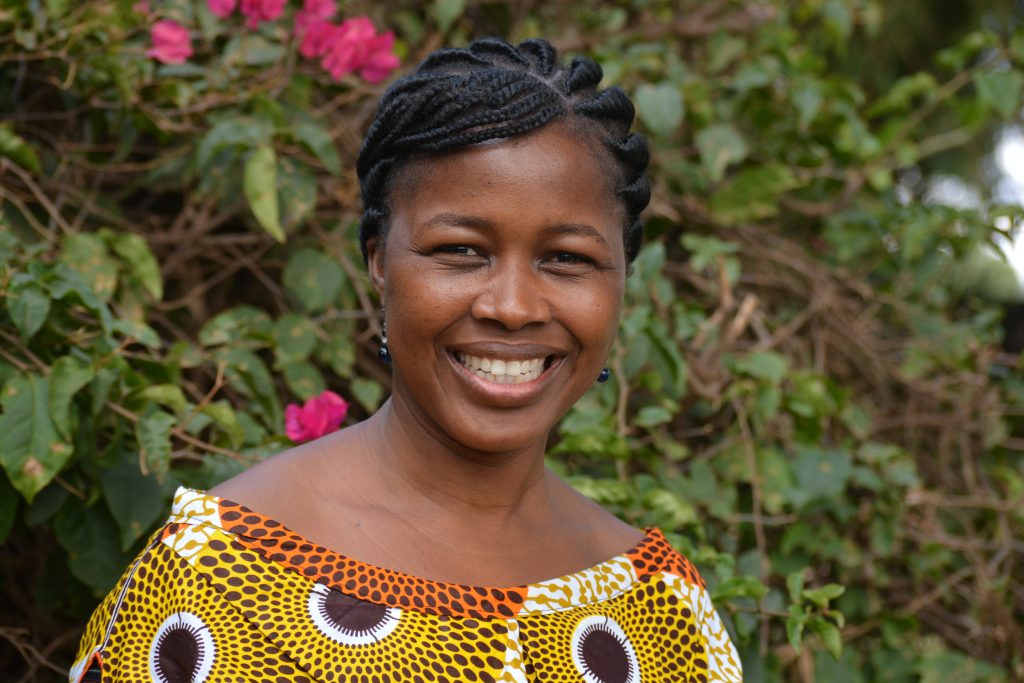
The African Development Bank (AfDB) records that since 2000, Africa has been experiencing remarkable economic growth accompanied by an improving democratic environment. However, most of the benefits of the high growth rates achieved over the last few years have not reached the rural poor. Smallholder farming generally remains inefficient with low productivity rates, and farmers face obstacles such as technology, market, and capital access.
2018 AWARD Fellow Dr. Éveline Marie Fulbert Windinmi Compaoré is an Innovations Systems Expert studying rural sociology and the sociology of agricultural innovations to better understand and overcome the inequalities in access to innovations between men and women.
Growing up in a small village in Burkina Faso, she knows all too well the hardships the smallholder farmers go through, compounded by market access, climate change, and environmental degradation. “Life was hard for my parents. She says that they did not earn much despite the effort they put on the farm”, she says.
To improve smallholder farmers’ involvement and competitiveness in agriculture, it is true that it will require different enabling factors, including finance, policy reforms, technologies, better research, and more.
Éveline explains that she watched her father interact with plant breeders, entomologists, or plant virologists who would sometimes demonstrate their innovations to the farmers. She felt she had to overcome her parents’ challenges, but not through farming because it was not lucrative. As a result, she thought of a different way to help her parents while improving the livelihoods of the rural farmers. Naturally, she focused her studies and career on agricultural innovation systems, particularly on rural sociology and the sociology of innovations. “I needed to be someone different. I was inspired to become an agricultural scientist to find solutions to improve the rural families’ living conditions,” she states.
Éveline explains that through her research, she explores the dynamics of decision-making in smallholder households, how those decisions impact the smallholders’ choices in selecting improved varieties, and how they use these varieties. She emphasizes that for innovations to work effectively, they must be inclusive so that it is a family movement instead of a family member.
Éveline also uses participatory research to help improve smallholders’ involvement in agriculture. She works with 1005 producers from 5 different regions in Burkina Faso through participatory workshops to help make the agricultural innovation system dynamic.
“I have this certainty that producers, men, women, young people, are specialists just like a researcher who is in the laboratory. They have options and choices they can make,” she states.
The contribution of smallholder farmers toward improving food security can not be overlooked. A 2015 Food and Agriculture Organization (FAO) report states that smallholders contribute 80% of food produced in Asia and SSA. The constant change in environmental and biodiversity contexts affecting farmers requires continuous research and innovation that is more adapted to the needs of the farmers.
How do we make farming profitable and competitive?
Éveline’s research aims to shed light on the agricultural innovation system’s end users’ component and other actors (producers and facilitators). She believes understanding these can better solve the burning issues faced in farming.
To better respond to farmers’ needs, she explains that her research results also serve breeders, entomologists, virologists, and more as it focuses on what is needed and who needs it on the value chain and why.
The agricultural production system has evolved, and thus, we must pay attention to what is happening on the ground. The connection between research and agriculture must be tangible. Research must address new challenges, including climate change and resource management, and old issues, including growth, productivity, and diversification. This calls for a host of actors working together to improve livelihoods.
“The challenges addressed by my research, like equitable access, must begin at the same as work in the labs so that when an innovation like a new crop or seed is ready, adoption follows seamlessly,” she says.
Éveline is also part of the gender and diversity team working across four countries through the African Centre of Excellence to ensure diversity in research as part of her commitment to improving smallholder livelihoods. She explains that technological advances and capacity building drive innovation. “For me, it is necessary to take stock of the farmers and interrogate who they are to support them better. Putting them in the same bag and rolling out the innovations is harmful,” she affirms.
Women are crucial to driving economic and sustainable agricultural transformation. Given equal access to productive resources, they could increase yields on their farms by 20-30 percent, lifting 100-150 million people out of hunger.
AWARD Fellowship equips women scientists with the skills they need to be good leaders, including soft skills, to make a difference. In 2018, it expanded its scope to francophone Africa, benefiting women scientists like Éveline.
AWARD is committed to helping achieve inclusive agricultural-driven growth and development by building a pool of capable, confident, and influential researchers to lead research that addresses the needs of African smallholders.
“The AWARD Fellowship has taught me everything is possible if I keep moving forward. It has allowed me to interact with other scientists and expand my network. I even became the head of my research unit during my Fellowship,” she says.
